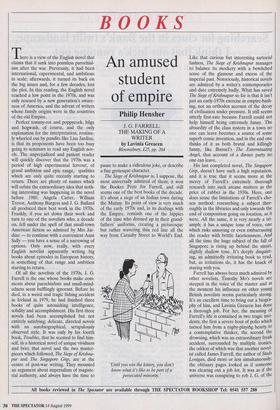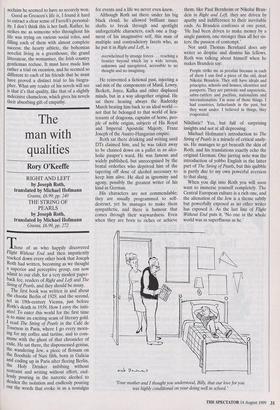BOOKS
An amused student of empire
Philip Hensher
J. G. FARRELL: THE MAKING OF A WRITER by Lavinia Greacen Bloomsbury, £25, pp. 264 There is a view of the English novel that claims that it sank into pointless parochial- ism after the war. Previously, it had been international, experimental, and ambitious in scale; afterwards, it turned its back on the big issues and, for a few decades, lost the plot. In this reading, the English novel reached a low point in the 1970s, and was only rescued by a new generation's aware- ness of America, and the advent of writers whose family origins were in the countries of the old Empire.
Perfect tommy-rot and poppycock, bilge and hogwash, of course, and the only explanation for the interpretation, routine- ly wheeled out by pundits like Lisa Jardine, is that its proponents have been too busy going to seminars to read any English nov- els. The unprejudiced and patient reader will quickly discover that the 1970s was a period of high experimental fervour, of grand ambition and epic range, qualities which are only quite recently starting to return. There are plenty of names which will refute the extraordinary idea that noth- ing interesting was happening in the novel before 1980. Angela Carter, William Trevor, Anthony Burgess and J. G. Ballard all produced their best work in the 1970s. Frankly, if you set down their work and turn to one of the novelists who, a decade on, fell under the spell of that small-town. American fiction so admired by Mrs Jar- dine — to continue with a convenient Aunt Sally — you have a sense of a narrowing of options. Only now, really, with every English novelist apparently writing big books about episodes in European history, is something of that range and ambition starting to return.
Of all the novelists of the 1970s, J. G. Farrell is the one whose books make com- ments about parochialism and small-mind- edness seem bafflingly ignorant. Before he died, in a weird and tragic fishing accident in Ireland in 1979, he had finished three books of quite astonishing intelligence, solidity and accomplishment. His first three novels had been accomplished but not entirely satisfying; delicate, directed novels with an autobiographical, scrupulously observed style. It was only by his fourth book, Troubles, that he seemed to find him- self, in a historical novel of unique vividness and brio; that novel and the two master- pieces which followed, The Siege of Krishna- pur and The Singapore Grip, are at the centre of post-war writing. They mounted an argument about imperialism of magiste- rial authority, and always have the time to pause to make a ridiculous joke, or describe a fine grotesque character.
The Siege of Krishnapur is, I suppose, the most universally admired of them; it won the Booker Prize for Farrell, and still seems one of the best books of the decade. It's about a siege of an Indian town during the Mutiny. Its point of view is very much of the early 1970s and, in its dealings with the Empire, reminds one of the hippies of the time who dressed up in their grand- fathers' uniforms, creating a picturesque but rather wavering thin red line all the way from Carnaby Street to World's End.
`Until you win the lottery, you don't know what it's like to be part of a persecuted minority.' Like that curious but interesting sartorial fashion, The Siege of Krishnapur manages to balance its mockery with a bewitched sense of the glamour and excess of the imperial past. Notoriously, historical novels are admired by a writer's contemporaries and date extremely badly. What has saved The Siege of Krishnapur so far is that it isn't just an early-1970s exercise in empire-bash- ing, nor an orthodox account of the decay of civilisation under pressure. It still seems utterly first-rate because Farrell could not help himself being extremely funny. The absurdity of the class system in a town no one can leave becomes a source of some superb comic invention, and in the end one thinks of it as both brutal and killingly funny, like Bunuel's The Exterminating Angel, that account of a dinner party no one can leave.
His last completed novel, The Singapore Grip, doesn't have such a high reputation, and it is true that it seems more at the mercy of Farrell's extremely thorough research into such arcane matters as the price of rubber in the 1930s. Here, one does sense the limitations of Farrell's cho- sen method: researching a subject thor- oughly in the libraries and only towards the end of composition going on location, as it were. All the same, it is very nearly a tri- umph; it has a unique tone of voice, one which risks annoying or even embarrassing the reader with brittle facetiousness. And all the time the huge subject of the fall of Singapore is rising up behind the smart, slightly shallow tone. It's deeply disquiet- ing, an admittedly irritating book to read, but, as irritations do, it has the knack of staying with you.
Farrell has always been much admired by other novelists. Timothy Mo's novels are steeped in the voice of the master and at the moment his influence on other young British novelists seems particularly strong. It's an excellent time to bring out a biogra- phy of him, and Lavinia Greacen has done a thorough job. For her, the meaning of Farrell's life is contained in two tragic inci- dents; the first a severe bout of polio which turned him from a rugby-playifig hearty .to a contemplative thinker, the second the drowning, which was an extraordinary freak accident, surrounded by multiple ironies, the oddest of which was that another novel- ist called James Farrell, the author of Studs Lonigan, died more or less simultaneously; the obituary pages looked as if someone was clearing out a job lot. It was as if the universe was conspiring to rob J. G. of the acclaim he seemed to have so securely won.
Good as Greacen's life is, I found it hard to extract a clear sense of Farrell's personal- ity. I don't think this is her fault. Rather, he strikes me as someone who throughout his life was trying on various social roles, and filling each of them with almost complete success: the hearty athlete, the bohemian novelist living in a greenhouse, the grand litterateur, the womaniser, the Irish country gentleman recluse. It must have made him rather a trial on occasion, and he seemed so different to each of his friends that he must have proved a distinct trial to his biogra- pher. What any reader of his novels will see is that it's that quality, like that of a slightly indecisive chameleon, which gives his novels their absorbing gift of empathy.



























































 Previous page
Previous page